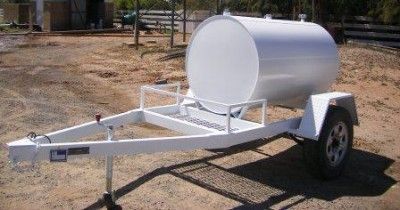High CG... any ill effects would depend on how heavy the tank and how high up it is. My Camper Special with the ginormous slide-in camper has a water tank; I can detect when it is full vs empty but it isn't bad, especially considering how huge, heavy, and high the camper itself is. I'd say that's a non-issue, as is the extra weight for accelerating the truck... unless your route is severe stop-n-go urban.

Now, since you run so much daily, you are generating a boat load of waste heat. Why not make a trailer for an insulated man-sized tank and really capture it? Back the trailer into the garage and thermosiphon or otherwise xfer the heat out. 250g tank = 2000 lbs water- no big deal- should hold enough heat to help heat the house, let alone the garage. Or maybe a 200g tank on a cheap Harbor Fright trailer. Yes you'd need some hose disconnects but I don't think that's technically insurmountable. Someone more into this than I should be able to calculate an estimate of how much recoverable heat there is...
P.S. OK I'll give it a shot to start things off:
It seems you put on 80 miles per 8-hour day during your route. Is that all urban/really short and frequent hops? There must be prolonged engine-off periods resulting in, oh, about a 1:1 off/on duty cycle (engine is off same amount of time it is on) at 20 mph average speed, to 2:1 @ 40 mph average?
At 17 mpg that's about 4.7 gallons of gas/day; x 114,000 BTU/gal = about 536,000 BTU gasoline input.
10-20% of input energy is lost to coolant and 20-30% lost to exhaust, assuming this guy is right:
http://umpir.ump.edu.my/1038/1/Abdul...in_Mohamad.pdf
536,000 x .1-.2 = 53,600-107,200 BTU raw coolant energy; plus 107,200-160,800 BTU exhaust heat energy.
A BTU raises 1 lb of water 1 degree F at atmospheric pressure. If we start with 60 degree water (garage ambient) and heat to 195 (standard thermostat/coolant temp?) and we have 53,600-107,200 BTUs:
53,600/(195 - 60)= 397 lbs;
107,200/(195 - 60)= 795 lbs of water needed...?
... or 50 to 100 gallons of water. But then what if we pressurize it. And use coolant... OK, so probably you don't need my trailer concept but if I haven't screwed up too badly thus far you might want 100 gallons for your heat sink.
It being a large vehicle, fueleconomy.gov suggests a 1% fe hit per 100lbs; 800lbs then being an 8% hit (?) then 17mpg x .92 = 15.64mpg, errr, about 1 solid mpg. 400/16= 25gal/week or 5.0 g/day up from 4.7 or 4.8; .2-.3 g/day x $3.50/g = $0.70-$1.05/day more gas, which perhaps can be hypermiled back out.
But wait! For the electric heater, watts x hours of use ÷ 1,000 x cost per kilowatt-hour = cost of operation; so 1500 x 2 / 1000 x .0724 (?) = 22 cents.
D'Oh!
This calculator
http://www.calculator.net/btu-calcul...heat&x=51&y=11 estimates you need 29,120 BTU/hour to keep 60 deg in when it's -10 deg out; at 8500 watts that's quite different from your claim that a 1500 watt heater does the job.
To get the estimator to agree with 1500 watts/hr I have to bump the insulation quality to "good" and the in/out temp spread to 20 deg. Evidently there's a shared wall or two with the house that is helping tremendously, and the furnace and water heater sitting right there must kick out noticeable heat i.e. substantial BTUs too with the ambient temp in the garage being about 40 degrees w/o the electric heater boost.
Anyhoo, 1500watts/hr = 5000 BTU/hr; If you could recover 100% of the coolant energy and dissipate it at that rate (53,600-104,700/5000) it would heat the garage about 11 to 22 hours. That ain't gonna happen so at 50% recovery you'd have 5 1/2-11 hours of heat. And so on.
Imagine how much better this all gets if one could recover the exhaust heat! You could heat the garage to warmer than the house then open the door from garage to house!

Anal-lytical types please pick the analysis apart for my inevitable mistake!

And/or gimme more info because I had to do an awful lotta guesstimating.
But I think you should get a Transit (garageable, and possibly cut your fuel use 50%) hybrid, or even an EV if you can plug in at lunch time instead. Then you can simply park inside again, or better yet, put that water heater tank in an insulated box in the back and open the box, windows, and hood when you park inside.
